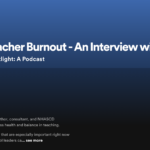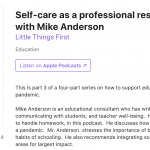Beating Teacher Burnout – Scholastic
Orignial Article: http://www.scholastic.com/teachers/article/beating-teacher-burnout
What Causes Burnout?
On top of everyday stressors like scant resources and long hours, there’s a surprising culprit behind many cases of burnout: teachers’ own beliefs that they’re not able to do all the different (and changing) parts of their job well.
Even skilled veterans sometimes feel like they’re bad at their jobs, explains Mike Anderson, a former teacher and the author of The Well-Balanced Teacher, simply because they’re being asked to do more than is possible.
When Anderson was still in the classroom, he realized he had an average of three and a half hours of class time to teach five hours’ worth of material each day. “I said, ‘Oh, this is one of the reasons I’m feeling so incompetent and exhausted.’ ”
Also, many teachers are bombarded with new initiatives. “Teachers are suffering from ‘initiative–itis,’ ” Anderson says. “They don’t feel like they’re able to get good at anything. When teachers are asked to implement something before they’ve even wrapped their heads around it, that adds a huge layer of stress.”
Watch for Warning Signs
For Pillars, burnout hit her quite suddenly one day last fall.
“I couldn’t stop crying, and I’m not a crier,” she says. “It was 7:30 in the morning, and one of my friends came in [to the classroom] and asked what was wrong, and I realized I’d been holding all this in for a really long time.”
Candace Roberts, an elementary teacher in Barrington, Rhode Island, was nearing the end of her 21st year in the classroom last spring when she started waking up with a pit in her stomach and experiencing panic attacks during her drive to work.
“It wasn’t happening during the summer,” she says, “and it wasn’t happening on vacations.”
There are other, subtler warning signs that burnout may be setting in. Roberts remembers negative thoughts taking over—things like “I’m the worst teacher in the world” or “I’ll never be able to get through to this class.” Other teachers report physical symptoms, like headaches or constant colds.
The clearest indicator of all, though, might be that you’re just not excited about your job anymore. If you look forward to leaving at the end of every day instead of arriving in the morning, you know it’s time to take action.
What You can Do About It
When she faced her bout of burnout, Roberts sought counseling and learned cognitive techniques to help her through tough periods, transforming her negative thoughts into positive “self-talk.” She also knew she needed to burn off negative energy—she began taking her running hobby more seriously, which allowed her to set and accomplish goals that were unrelated to teaching. And she deleted her school e-mail account from her phone and stopped checking the account at home after 7 p.m. “That has made a huge difference,” she says.
Nicole Zuerblis, a literacy coach in Langhorne, Pennsylvania, advises that teachers have at least one close confidant on staff, “someone you can vent to appropriately.” Cora Kolosso, an art teacher at a private school in New York City, agrees, and also recommends connecting with colleagues socially—although she warns against letting get-togethers turn into gripe sessions. “Staying out of drama is really, really important,” she says.
Pillars’s first step toward conquering burnout began with taking a personal day. She used the time to start rethinking her work priorities, and to recognize which parts of her job involved things she simply couldn’t control. “I have more on my plate now than I did last year,” she says. “But I know now when to step back and say, ‘Is this important to my students? Is this important to my family?’ ”




